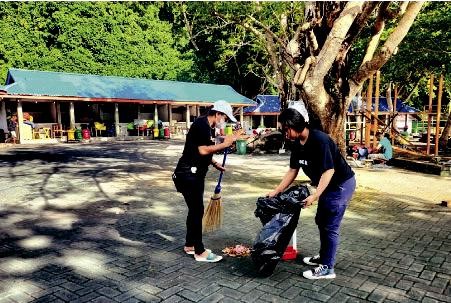
In Indonesia, Muhammadiyah promotes inter-religious collaboration by responding to climate change.
Climate change has many faces in Indonesia. Indonesians living in Sumatra and Kalimantan know it through increased rainfalls which have increased the risks of flooding. People in Java, Bali and Nusa Tenggara feel it through drier seasons which have increased the risk of drought. People in the coastal areas of Indonesia see steady sea-level rises which puts them are at risk of flooding and seawater intrusion. They note large-scale changes in fish habitat, including the fish that they rely on for food and livelihoods.
Indonesians’ experiences of climate change are deeply entangled with human activity, from causes to consequences, and also from meanings to adaptations. Their understanding of climate change is “entangled with all the ways in which religion shapes, haunts, interprets, inspires, or otherwise attends human ways of being “[1].
Muhammadiyah is interested in how religious thought interprets climate change in different ways, how religious dynamics can intensify conflicts around changing livelihoods and how religious action can help respond to climate change. Muhammadiyah knows that interpreting climate change involves evaluating how Indonesians relate to one another, as well as how they interact with other species and the planet itself. This raises questions of inter-religious coexistence and collaboration.
Convinced that contemporary challenges – such as climate change – affect everybody irrespective of religious affiliations, ten years ago Muhammadiyah founded Faith to Action Network as a platform of interreligious action at international level. Closer to home, Muhammadiyah collaborates with faith leaders from Indonesia’s six main religions to promote peaceful coexistence through interreligious environmental sustainability management. They see environmental issues as common challenges that affect everyone regardless of religion. This ecological perspective, helps place an emphasis on action-oriented strategies for promoting peaceful coexistence and freedom of religion and belief. The project manager says:
“We have been doing dialogue for a long time; now it is time for actions on the challenges that face us. Actions are more important and complement dialogue.” Surya Muhammad, Project Manager, Muhhamadiyah Indonesia.
In many parts of Indonesia, Muhammadiyah offers a wide range of trainings and courses on environmental preservation. East Java, West Kalimanta, Central Java, and North Maluku are the four Indonesian provinces where Muhammadiyah engages approximately 2000 people in environmentally friendly activities. Tree planting, beach cleaning, cycling for religious sites, and discussions on co-existence and environmental protection have all been included in the trainings.
Moreover, Muhammadiyah keeps an eye on inclusion, and ensuring that activities don’t discriminate against anyone as noted by a member of Fatayat NU, a partner of Faith to Action Network, who is involved on the project:
“We do not look at differences among people in our interactions; we look at our similarities.” Neng Yanti, Fatayat NU, Indonesia.
As a long-term goal of this initiative, Muhammadiyah will construct a series of interreligious ecological guides or modules and conduct training and seminars with the participation of youth, religious leaders, and women from different faith communities. In this training series, participants are expected to develop their knowledge and abilities in designing and implementing a collaborative action that contributes to environmental sustainability management activities in their respective regions.
This initiative is part of the Joint Initiative for Strategic Religious Action (JISRA) programme which aims for peaceful and just societies where all enjoy Freedom of Religion and Belief. JISRA stimulates positive forces within and between religious communities for more peaceful and inclusive societies. JISRA leverages the constructive role of religious actors. This programme addresses harmful norms and narratives within religious communities, stimulates cooperation between religions and shows that different religious traditions can come together in their vision for a better and fairer society. JISRA pays special attention to increasing the role of women and youth in setting the vision and solutions to advancing FoRB and promoting youth and women’s participation in decision-making fora.
[1] Jenkins, Willis, Berry, Evan and Beck Kreider, Luke (October 2018), “Religion and Climate Change.” In Annual Review of Environment and Resources, Vol. 43:85-108



